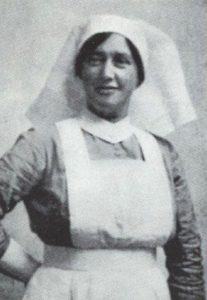Elizabeth O'Farrell (1883 – 1957) - Nurse, Irish Republican, Cumann na mBan

Elizabeth O’Farrell was born on 5 November 1883 in Dublin to parents Christopher O’Farrell and Margaret Kenneah.
She was educated by the Sisters of Mercy. Her father died when she was young and she was sent to work. She took a job in Armstrong’s a printers in Amiens Street. Her mother had a small shop on the City Quay Dublin.
Elizabeth was a member of the Sacred Heart and Total Abstinence sodalities, was a part of the Gaelic League and became fluent in Irish. In 1906 she joined Inghinidhe na hÉireann, then Cumann na mBan after its establishment in 1914.
O’Farrell acted as a dispatcher before and during the Easter Rising of 1916. She and other nurses, including good friend, Julia Grenan, were sent around the bullet-torn streets of Dublin during the week with dispatches, food and ammunition hidden in their long skirts.
Elizabeth also cared for the wounded, including James Connolly. Women and wounded were evacuated from the GPO on the Friday of Easter Week, but O’Farrell, Grenan and Winifred Carney stayed behind with the remainder of the troops, who retreated to a nearby house in Moore Street.
On Saturday, Patrick Pearse chose Elizabeth O’Farrell to seek surrender terms from Brigadier-General Lowe. At 12.45 pm she was handed a Red Cross insignia and a white flag and asked to deliver the surrender to the British military.
She emerged into heavy fire on Moore Street which abated when her white flag was recognised. She was taken to Brigadier General William Lowe who sent her back to Pearse at number 16 Moore Street with a demand for unconditional surrender. Pearse agreed and, accompanied by O’Farrell, surrendered in person to General Lowe.
O’Farrell was then taken to the Dublin Castle hospital where she was stripped of her clothing and possessions and stayed for one night. The following day she was taken to Ship Street barracks and was informed was to be sent to Kilmainham jail and held as a prisoner.
Brigadier-General Lowe had given her his word of honour that she would not be made a prisoner. When he heard how she had been treated he came to her personally to apologise and to give orders for the return at once of money which had been taken from her.
O’Farrell spent the rest of life working as a midwife and nurse in the National Maternity Hospital, Dublin. When the Irish Government allowed the Bureau of Military History to begin collecting oral history of the Irish Revolutionary period for historical purposes, O’Farrell refused to participate, declaring, “All governments since 1921 have betrayed the Republic.”
While on holiday in Bray along Miss Julia Grenan, Elizabeth collapsed and died unexpectedly. She was 73 years old and is buried next to Julia Grenan in Glasnevin Cemetery.